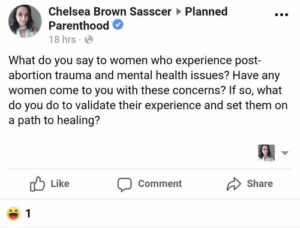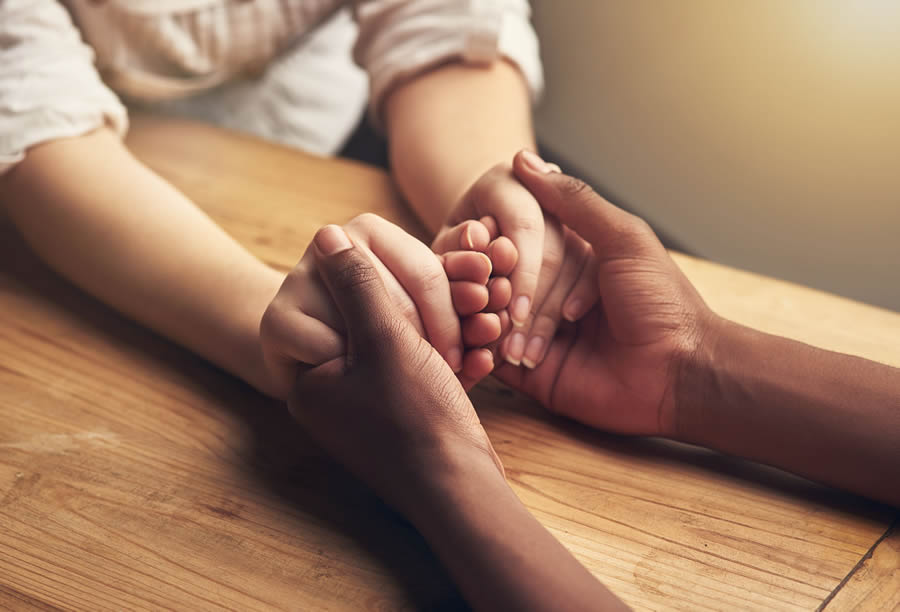By: Chelsea Brown – stream.org – May 1, 2019
I’m a post-abortive woman. I know how hard it is to toe the line between regret and repentance for abortion, and compassion and wisdom for those who have had abortions, too.
Abortion is sold to women as a quick fix. It will free them of the burdens that motherhood would potentially impose on them. The truth is, unless you’ve had an abortion yourself — and don’t deny what abortion is — it’s hard to understand how such brutality could also be met with compassion and forgiveness.
Learning to Grieve
Healing from abortion — which is the direct taking of an innocent unborn human life — is never done. Something happens to you once you’re willing to be honest with yourself, though. You grieve. You learn that while it’s not okay to take a human life, it’s natural to grieve. You learn that most people who try to rob you of that grief know not what they do. They have never looked in the face of the overwhelming shame and horror that comes from realizing you’ve allowed your own child’s innocent blood be shed. They don’t understand the overwhelming grace and forgiveness that grows from such a radically honest admission.
Once the veil is lifted, you can see through the deceit and manipulation of the abortion industry. You can see the pain of those whose hateful and berating words ricochet off the knowledge of the truth. For those with severe pain, another woman daring to show the vulnerability of their experience feels like a threat. They’ve carefully constructed and fiercely protected their reality.
That is exactly what happened when I decided to go to Planned Parenthood’s Facebook page. I asked a question about healing resources as a healing post-abortive woman.
A Question to Planned Parenthood

“What do you say to women who experience post-abortion trauma and mental health issues? Have any women come to you with these concerns? If so, what do you do to validate their experience and set them on a path to healing?”
Admittedly, I am now pro-life. But I did not divulge this fact in my question. I wanted it to be a neutral question that stood on its own. But to my horror, the resulting comments ended up revolving around my “dishonest questioning” and “trolling” of a pro-choice page. Some commenters began stalking my personal profile, and others.’ They stalked my post-abortive pro-life page where I have shared my personal abortion story and where I share information about abortion healing and pro-life related articles.
They argued that I didn’t come to ask an honest question. I came to shame women about their abortions and to wreak havoc on Planned Parenthood’s page.
I’m a pro-life woman. Considering that fact, along with the extremely polarized state of the abortion debate, I can see how they felt that I was trolling. But this accusation is not grounded in reality. Rather, it is grounded in the false reality of Planned Parenthood’s “reassurances.” These enabled many of the women commenting to go immediately into attack mode. They didn’t consider the question and experience at hand as valid to at least one woman.
Woman-to-Woman Abuse
The thread quickly devolved into a frenzy of woman-to-woman abuse. It was an utterly heartbreaking demonstration of the destruction of abortion on the hearts and souls of women. And the neglect of Planned Parenthood to protect and validate every woman. It spoke to their “commitment” to all women when they failed to promote a supportive atmosphere for women to speak candidly about their experiences. Or to ask questions when necessary.
Some may say, “What did you expect?”
Well, I expected this sort of vitriol at least to some degree, though I have to say, it was stunning just how vile it was.
But more than that, I expected a positive outcome too. An invisible outcome, perhaps, but positive.
Worthy of Care
Women who are staunchly pro-choice, women who are staunchly pro-life, women who are not quite sure, women who lean more one way depending on the circumstances, women facing their own unplanned pregnancies, women who are struggling silently with their abortions may see this question, too. They would see it and they would know that they are worthy of care and consideration after their abortions as much as they were before them.
They would know there are other women who have had strong emotional reactions to their abortions — whether days, months, or years later. And that those reactions are valid and worthy of acknowledgement. They would know that there are reasons for these strong reactions. Despite what they believed or were told at the time of their abortion, abortion is not natural. But their pain and grief is, and it’s a sign of their humanity. These were my intentions for asking my question on Planned Parenthood’s page.
In the end, the question posed was never truly answered. Planned Parenthood never responded to my question. Even after the thread had gone on for over 24 hours with abusive commentary. Even after tagging Planned Parenthood directly, and asking them if this is the kind of woman-to-woman treatment they condone.
Pro-Choicers’ Advice
But many pro-choice commenters gave direct and simple advice.
“See a counselor,” they said, providing a link to Planned Parenthood’s counseling and referral services.
“Abortion regret is not real,” they also said. “Post-Abortion Stress Syndrome (PASS) is not real,” they said. “Stop using your experience to control other women’s bodies,” they said. “95 percent of women do not feel any regret regarding their choice,” they said, citing sources and studies of pro-choice biased data sets.
To see the tweets and responses and the remainder of this article, click read more.
 Listen Online
Listen Online Watch Online
Watch Online Find a Station in Your Area
Find a Station in Your Area








 Listen Now
Listen Now Watch Online
Watch Online
